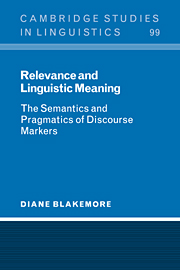Introduction
Published online by Cambridge University Press: 18 December 2009
Summary
Titles of books are often deceptive. My discovery of a copy of Austin's (1962) How to do things with words in a bookshop amongst various manuals on composition and writing skills was amusing but understandable. While it is unlikely that this book will be incorrectly catalogued on the basis of its title, it is possible that it will give rise to expectations that it will not fulfil. Indeed, that is its point. For the aim of this book is to show that there is no justification for writing a book about discourse or discourse markers at all.
A book which has ‘discourse markers’ in its title suggests that there is a class of phenomena which can be called ‘discourse markers’. In earlier work (Blakemore 1987, 1992) I refer to the expressions which appear in this book as ‘discourse connectives’, while other writers (e.g. Fraser 1990, Schiffrin 1987, Stubbs 1983) call them ‘discourse markers’. The problem is that since there is no agreement on what counts as a discourse marker, it is difficult to know whether these are two labels for the same set of phenomena. Compare, for example, the discrepancies between the lists of discourse markers given by Fraser (1990) with the one given by Schiffrin (1987)
consequently, also, above all, again, anyway, alright, alternatively, besides, conversely, in other words, in any event, meanwhile, more precisely, nevertheless, next, otherwise, similarly, or, and, equally, finally, in that case, in the meantime, incidentally, OK, listen, look, on the one hand, that said, to conclude, to return to my point, while I have you (Fraser 1990)
oh, well, but, and, or, so, because, now, then, I mean, y'know, see, look, listen, here, there, why, gosh, boy, this is the point, what I mean is, anyway, whatever (Schiffrin 1987)
- Type
- Chapter
- Information
- Relevance and Linguistic MeaningThe Semantics and Pragmatics of Discourse Markers, pp. 1 - 11Publisher: Cambridge University PressPrint publication year: 2002



